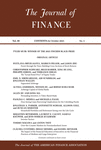-
作者:Berkovitch, Elazar; Israel, Ronen; Spiegel, Yossef
作者单位:University of Michigan System; University of Michigan
-
作者:Srivastava, Sanjay
作者单位:Carnegie Mellon University
-
作者:Viswanathan, S.; Wang, James J. D.
作者单位:Duke University
-
作者:Stein, JC
作者单位:National Bureau of Economic Research
摘要:This article examines the role of corporate headquarters in allocating scarce resources to competing projects in an internal capital market. Unlike a bank, headquarters has control rights that enable it to engage in ''winner-picking''-the practice of actively shifting funds from one project to another. By doing a good job in the winner-picking dimension, headquarters can create value even when it cannot help at all to relax overall firm-wide credit constraints. The model implies that internal ...
-
作者:Campa, Jose M.; Chang, P. H. Kevin
作者单位:University of Southern California
-
作者:Chalmers, John M. R.; Kadlec, Gregory B.
作者单位:University of Oregon
-
作者:Jackwerth, Jens Carsten; Rubinstein, Mark
作者单位:University of California System; University of California Berkeley
-
作者:Stambaugh, Robert F.
作者单位:University of Pennsylvania
-
作者:Angel, JJ
摘要:Minimum price variation rules help explain why stock prices vary substantially across countries, and other curiosities of share prices. Companies tend to split their stock so that the institutionally mandated minimum tick size is optimal relative to the stock price. A large relative tick size provides an incentive for dealers to make markets and for investors to provide liquidity by placing limit orders, despite its placing a high floor on the quoted bid-ask spread. A simple model suggests tha...
-
作者:Wang, K; Li, YM; Erickson, J
作者单位:California State University System; California State University Fullerton
摘要:It is well documented that expected stock returns vary with the day-of-the-week (the Monday or weekend effect). In this article we show that the well-known Monday effect occurs primarily in the last two weeks (fourth and fifth weeks) of the month. In addition, the mean Monday return of the first three weeks of the month is not significantly different from zero. This result holds for most of the subperiods during the 1962-1993 sampling period and for various stock return indexes. The monthly ef...


